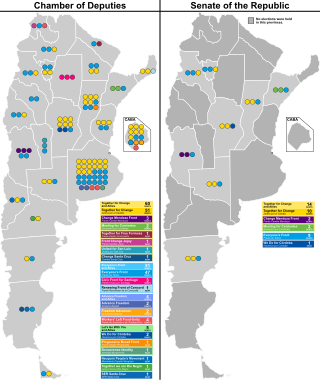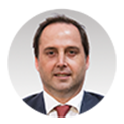Electoral calendar
Some election dates are not yet confirmed (not listed), and some can vary according to new legislation.
March 13
 Catamarca
Catamarca
On 13 March 2011, Catamarca Province elected governor, 8 provincial senators, and 20 provincial deputies, thus renewing half of both chambers.
The ticket for governor and vice-governor is elected by simple majority on a direct election, for a 4-year period. They can be indefinitely re-elected. Provincial deputies are proportionally elected on a single district by D'Hondt method for a 4-year period and provincial senators are uninominally elected in each of the 16 Departments of Catamarca for a 4-year period. Both Deputies and Senators can also be indefinitely re-elected. Both chambers of the provincial legislature are renewed by halves every two years. Catamarca Electoral Law (Art. 90) establish the second Sunday of March, every two years, as the date for provincial elections. By law, women ought to hold at least 30% of the nominations, in expectant positions.
Incumbent Eduardo Brizuela del Moral (UCR), who was looking for his third consecutive mandate with the alliance Civic and Social Front of Catamarca (FCyS) that governed the province since 1991, surprisingly lost the election to Lucía Corpacci, [2] a current National Senator and former Vice-Governor of Brizuela del Moral, who headed a Justicialist Party joint list (between both the pro- and the anti- national government factions). Lucía Corpacci will become the second elected female governor of an Argentine province ever.
Other candidates were: Liliana Barrionuevo, sister of union leader Luis Barrionuevo, for Primero Catamarca-PRO, Julio César Andrada for MST-Proyecto Sur, Ignacio Díaz for Polo Obrero-PO and Marcelo Cisternas for Concertación-FORJA.
From the 20 Chamber of Deputies seats and 8 Chamber of Senators seats to be renewed, the ruling coalition had 9 and 5 at stake. The departments which renewed senators were Ambato (FCyS), Andalgalá (FpV), Belén (FCyS), Capital (FpV), Fray M. Esquiú (FCyS), Pomán (FpV), Santa Rosa (FpV) and Valle Viejo (FCyS), each major political alliance electing 4 provincial senators.
Local executive and legislative elections were also held in 34 of 35 Intendencies of Catamarca. San Fernando del Valle de Catamarca, the capital and largest city (with about 50% of the total population) elected Raúl Jalil (FpV) as Mayor.
Catamarca represents 0,89% of the national electorate. Voter turnout was about 70%.
Summary of the 13 March 2011 Catamarca provincial election results| Provisional results (98,72% of votes) |
| Governor candidate | Party or coalition | Governor | Deputies | Senators elected |
|---|
| Votes | Percent | Votes | Percent |
|---|
| Lucía Corpacci | Front for Victory Alliance | 85,495 | 48,22% | 78,401 | 44,22% | 4 |
| Eduardo Brizuela del Moral | Civic and Social Front of Catamarca | 78,509 | 44,28% | 74,969 | 42,29% | 4 |
| Liliana Barrionuevo | Primero Catamarca-PRO | 4,003 | 2,28% | 4,727 | 2,67% | |
| Julio César Andrada | MST-Proyecto Sur | 2,516 | 1,42% | 2,964 | 1,68% | |
| Ignacio Díaz | PO | 1,899 | 1,07% | 2,546 | 1,44% | |
| Blank votes | 3,563 | 2,01% | 5,441 | 3,07% | |
| Null votes | 1,124 | 0,63% | 703 | 0,39% | |
| Total votes | 177,291 (70%) | 100.00 | | | |
| Source: Catamarca Judicial Power (with department breakdown) |
March 20
 Chubut
Chubut
On 20 March 2011, Chubut Province elected a governor and 27 provincial deputies, thus renewing the whole legislature. Chubut will also elect 3 members of the provincial Judiciary Council.
The ticket for Governor and Vice-Governor is elected by simple majority on a direct election, for a 4-year period. They can be re-elected for a single consecutive time, either in the same order or in alternating positions. The unicameral legislature, the Chamber of Deputies, is renewed every four years. The provincial deputies can be re-elected. The legislative election is direct in a single district: the most voted party gains 16 seats (60%) and the remaining 11 seats are proportionally divided among the following party lists, by D'Hondt method, without threshold.
The main candidates for Governor are the current Mayor of Comodoro Rivadavia, Martín Buzzi (Modelo Chubut-Federal Peronism, PJ), supported by incumbent Governor Mario Das Neves; and Mayor of Puerto Madryn, Carlos Eliceche (Front for Victory, PJ), allied to the national government. Two-times Governor Das Neves cannot run for re-election, and it is currently a presidential pre-candidate. Provincial parties Proyección Vecinal Chubutense (ProVeCh), second in the last elections and allied to the provincial government, as well as Acción Chubutense (PACh), will run on their own lists. Other candidates are Mayor of Rada Tilly Pedro Peralta, for the Radical Civic Union (that governed the province until 2003) and provincial deputy Fernando Urbano, for the Civic Coalition ARI.
The current Chamber of Deputies is made up of 18 pro-government (14 Modelo Chubut-PJ and 4 ProVeCh) deputies, 4 UCR, 3 Kirchnerites (2 former PJ, 1 former ProVeCh), 1 PACh, 1 ARI. Chubut represents 1.22% of the national electorate.
The elections yielded inconclusive results initially, as Buzzi's total of 37.8% (against Eliceche's 37.2%), and his winning margin of 1,551 votes led to a recount when irregularities led to a judicial injunction against results in six precincts totaling 1,967 votes. [3] Following a protracted recount process, as well a court-ordered re-vote held on May 29 in the six impugned precincts, Buzzi, albeit with a narrowed lead of 384 votes, was officially elected Governor of Chubut. [4]
Local elections were also held in 27 Intendencies. Results in these elections created an ironic twist to the headline gubernatorial race: Comodoro Rivadavia, where Buzzi had been Mayor, elected the opposition FpV candidate, Néstor di Pierro; and Puerto Madryn, where Eliceche had been Mayor, elected the opposition Federal Peronist candidate, Ricardo Sastre.
July 10
 Buenos Aires
Buenos Aires
On 10 July 2011, the Autonomous City of Buenos Aires held the first round of its local elections. The runoff is scheduled for 31 July.
Summary of the 10 and 31 July 2011 Buenos Aires Chief of Government election results| Candidate | Party or coalition | First round | Second round |
|---|
| Votes | Percent | Votes | Percent |
|---|
| Mauricio Macri | PRO | 830,016 | 47.08 | 1,086,971 | 64.25 |
| Daniel Filmus | FpV-PJ | 489,760 | 27.78 | 604,822 | 35.75 |
| Fernando Solanas | Proyecto Sur | 225,917 | 12.82 |
| María Eugenia Estenssoro | CC-ARI | 58,483 | 3.32 |
| Silvana Myriam Giudici | UCR | 36,372 | 2.06 |
| Jorge Telerman | Frente Progresista | 31,002 | 1.76 |
| Luis Zamora | AyL | 25,886 | 1.47 |
| Ricardo López Murphy | Partido Autonomista | 24,834 | 1.41 |
| Other candidates | 40,563 | 2.30 |
| Blank votes | 22,543 | 1.25 | 42,568 | 2.38 |
| Nulls votes | 14,771 | 0.82 | 49,586 | 2.77 |
| Challenged and appealed votes | 2,142 | 0.12 | 4,088 | 0.23 |
| Voter turnout | 1,802,289 | 73.03 | 1,691,793 | 72.16 |
| Source: C.A.B.A. |
The incumbent Macri's running mate is María Eugenia Vidal. Carlos Tomada is the running mate of Filmus.
September 18
 Chaco
Chaco
On 18 September 2011, Chaco Province elected governor and 16 provincial legislators.















